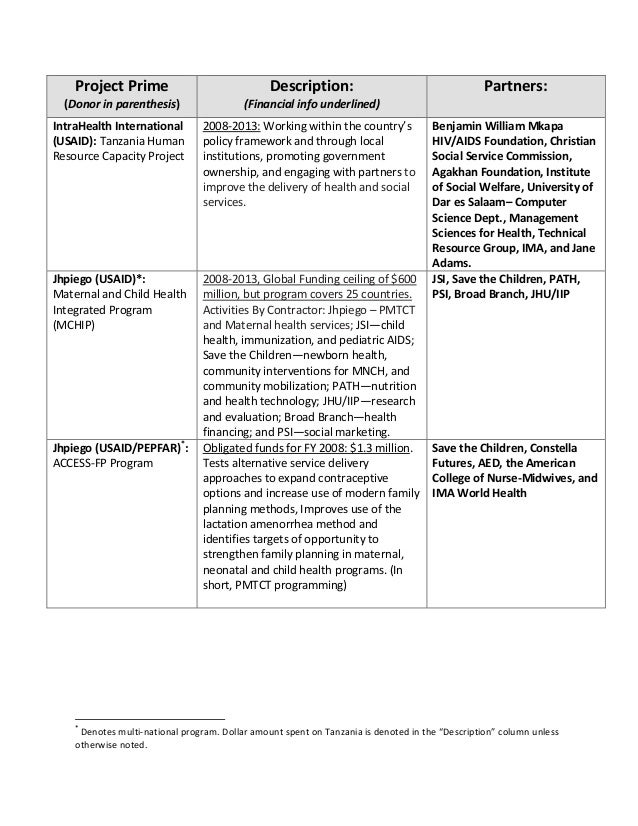Pmtct Program In Tanzania
US EMBASSY TANZANIA JOBS – PMTCT Program OfficerOPEN TO: All Interested Candidates/ All sourcesPOSITION: PMTCT Program OfficerOPENING DATE: May 24, 2017CLOSING DATE: June 2, 2017WORK HOURS: Full-time; 40 hours/weekSALARY: Ordinarily Resident (OR): FSN- 10; (Step 1- TZS 51,002,394through Step 13- 76,503,594 per annum)Not-Ordinarily Resident (NOR): FP- 5 (steps 5 through 14).Finalgrade/step for NORs will be determined by Washington.The “Open To” category listed above refers to candidates who areeligible to apply for this position.


Pmtct Program In Tanzania Africa
TanzaniaTanzania is home to nearly 48 million people, most of whom live in rural areas with limited access to reproductive health care. As a result, 25% of Tanzanian women would like to plan their families but do not have access to contraceptives, many pregnant Tanzanian women do not receive testing or counseling for HIV, and 50% of Tanzanian mothers do not deliver their babies at a health facility.EngenderHealth, in partnership with the Ministry of Health, Community Development, Gender, Elderly and Children (MOHCDGEC), works in Tanzania nationwide on family planning (FP), gender issues, FP-HIV integration, and other health initiatives. The expansion of EngenderHealth’s FP program to all 26 regions of the country has contributed to women’s having a wider choice of methods, including the highly effective but harder to deliver hormonal implants, intrauterine devices (IUDs), and permanent methods, such as female sterilization. Increased access and choice has led to rising use of contraception, through interventions like the RESPOND Tanzania Project (RTP), which expanded services to lower-level facilities and promoted task shifting to nurse practitioners for implants and IUDs.

The use of hormonal implants in Tanzania has increased steadily since 2004.From 2013 to 2015, the (ExpandFP) complemented the national FP program and RTP’s efforts by training providers at 21 facilities across the Arusha and Iringa health zones (inclusive of six regions); these providers could not have been trained with existing resources. EngenderHealth and the MOHCDGEC worked to increase access to and use of FP at the facility level during routine services and special FP day events, as well as using mobile outreach services to improve access within hard-to-reach communities. The holistic program design also worked to improve the quality of these services, supervision, and the use of data for decision making, particularly for contraceptive security. ExpandFP activities in Tanzania were successfully completed in September 2015. End-of-project results show that FP service delivery significantly expanded over the project period, with a total of 160,378 clients adopting contraception via project-support services, compared with 25,138 clients in the preintervention baseline period. Additional information on project results, including large increases in the use of long-acting methods of contraception, are available.EngenderHealth further works to ensure the reproductive rights of Tanzanian women and their families by integrating FP with and comprehensive postabortion care services.
Pmtct Program In Tanzania Africa
As part of our work in HIV, we have facilitated outreach to marginalized groups, including sex workers, key and vulnerable populations, and youth; in 2008, we launched a to improve gender equity and reduce the prevalence of gender-based violence and disease.EngenderHealth’s work in Tanzania is changing the health care landscape. Today, long-acting and permanent contraceptive methods are in high demand throughout the country. At EngenderHealth-supported sites, the rate of HIV transmission from mothers to newborns is at an all-time low, and most postabortion clients leave the clinic with a contraceptive method of their choice. More needs to be done to achieve national reproductive health goals, and EngenderHealth is committed to continuing our work to improve the access of Tanzanian women, men, and families to quality reproductive health.Share this page.